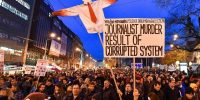
Cómo se conquista la libertad de prensa
Cada año, el 3 de mayo, el Día Mundial de la Libertad de Prensa, los productores y consumidores de noticias se detienen a reflexionar sobre el estado de los medios de comunicación a nivel mundial. Este año, cuando periodistas y funcionarios gubernamentales se reúnan en Ghana para la 25ª edición de la celebración de esta fecha, la atención se centrará en las innumerables presiones y desafíos que enfrenta la profesión a lo largo de todo el mundo, y en las formas cómo la hostilidad – tanto la oficial como aquella patrocinada por el Estado – dirigida contra la prensa pone en peligro la democracia.… Seguir leyendo »






